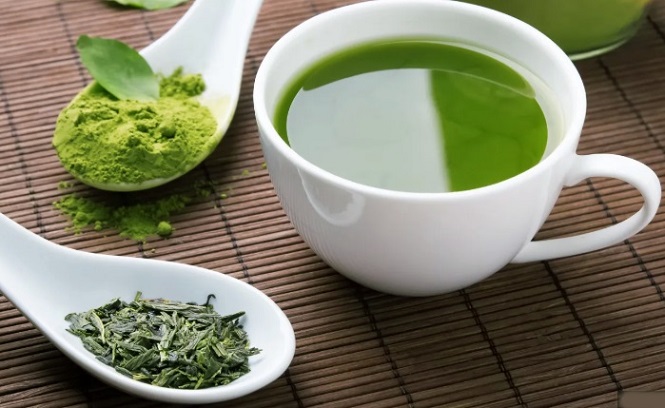Green Tea Compound and Quercetin Show Promise in Enhancing Liver Cancer Treatment
Nikhil Prasad Fact checked by:Thailand Medical News Team Jan 20, 2025 2 months, 3 weeks, 3 days, 17 hours, 43 minutes ago
Medical News: Liver cancer, particularly hepatocellular carcinoma (HCC), is a leading cause of cancer-related deaths worldwide. In 2022, global incidence and mortality rates for liver cancer stood at 8.6 and 7.4 per 100,000 people, respectively. Sorafenib, a multikinase inhibitor, is a first-line therapeutic drug for advanced HCC. However, it provides significant benefits to only 30% of patients, with resistance typically developing within six months. This limited efficacy has fueled the search for novel treatment strategies. Researchers from the State Key Laboratory of Tea Plant Biology and Utilization at Anhui Agricultural University in Hefei, China, have explored a unique avenue involving natural compounds to enhance the effectiveness of sorafenib.
 Green Tea Compound and Quercetin Show Promise in Enhancing Liver Cancer Treatment
Dietary Compounds in Focus: EGCG and Quercetin
Green Tea Compound and Quercetin Show Promise in Enhancing Liver Cancer Treatment
Dietary Compounds in Focus: EGCG and Quercetin
This
Medical News report highlights the potential of two dietary polyphenols, epigallocatechin-3-gallate (EGCG) from green tea and quercetin found in many fruits and vegetables, to improve the efficacy of sorafenib in treating HCC. The study centered on quiescin sulfhydryl oxidase 1 (QSOX1), an enzyme implicated in cancer progression. Intracellular QSOX1 can suppress tumor growth, while its extracellular presence promotes cancer cell adhesion, invasion, and metastasis. By modulating the secretion of QSOX1, researchers found that both EGCG and quercetin significantly increased intracellular levels of the enzyme while decreasing its extracellular levels, thus sensitizing HCC cells to sorafenib.
Experimental Findings
The researchers examined eight dietary polyphenols - EGCG, quercetin, fisetin, myricetin, caffeic acid, chlorogenic acid, resveratrol, and theaflavin - to assess their ability to inhibit QSOX1 secretion in HCC cell lines (HepG2 and Huh7). Among these, only EGCG and quercetin demonstrated significant effects. Key findings include:
-Intracellular QSOX1 Accumulation: Both EGCG and quercetin significantly increased intracellular QSOX1 levels in HCC cells without affecting cell viability. This enhancement occurred in a dose-dependent manner, with optimal results observed at concentrations between 50-200 µM.
-Extracellular QSOX1 Reduction: The same compounds effectively reduced extracellular QSOX1 levels, disrupting the extracellular matrix that supports cancer cell growth and metastasis.
-Synergistic Effects with Sorafenib: Combining sorafenib with either EGCG or quercetin amplified its efficacy, inducing apoptosis and reducing cell migration and invasion. For instance, apoptosis-related proteins such as Bax were upregulated, while anti-apoptotic proteins like Bcl-2 were suppressed.
Mechanisms of
Action
The study revealed that sorafenib’s inability to alter QSOX1 levels is counteracted by the effects of EGCG and quercetin. By increasing intracellular QSOX1, these compounds inhibite
d the Nrf2 pathway, thereby sensitizing HCC cells to sorafenib.
Simultaneously, the reduction in extracellular QSOX1 impaired the extracellular matrix’s structure, further restricting cancer cell proliferation and migration. These dual effects highlight the compounds' potential as adjuvants to standard therapies.
Clinical Implications and Challenges
While these findings are promising, translating them into clinical practice presents challenges. One major issue is achieving effective concentrations of EGCG and quercetin in the human body. In vitro experiments used concentrations of 50-200 µM, but typical plasma concentrations after oral intake are much lower. However, researchers suggest that high doses of green tea or quercetin supplements may yield similar results due to the presence of bioactive metabolites and oxidation products.
Study Limitations and Future Directions
The study primarily focused on cellular mechanisms and lacked in vivo validation or clinical correlation using patient-derived samples. Additionally, the exact mechanism by which EGCG and quercetin inhibit QSOX1 secretion remains unclear. Researchers hypothesize that these compounds may interfere with proteolytic cleavage or glycosylation processes essential for QSOX1 secretion. Future studies should investigate these pathways and assess the compounds’ efficacy in animal models and clinical trials.
Conclusion
The research underscores the potential of EGCG and quercetin as natural adjuvants in HCC treatment. By modulating QSOX1 levels, these compounds enhance the therapeutic effects of sorafenib, inducing apoptosis and inhibiting cancer cell migration and invasion. While further studies are needed, these findings open new avenues for integrating dietary compounds into cancer treatment regimens.
The study findings were published in the peer-reviewed journal: Antioxidants.
https://www.mdpi.com/2076-3921/14/1/106
For the latest on Liver Cancer, keep on logging to Thailand
Medical News.
Read Also:
https://www.thailandmedical.news/news/breaking-study-finds-that-covid-19-accelerates-liver-cancer-growth-and-spread-via-exosomes-derived-from-syncytia
https://www.thailandmedical.news/news/medical-news-rhoifolin-as-a-potential-game-changer-in-liver-cancer-treatment
https://www.thailandmedical.news/news/sars-cov-2-spike-protein-interacts-with-12-liver-proteins-reactivates-hbv-and-activates-pre-cancerous-pathways
https://www.thailandmedical.news/news/quercetin-as-a-potential-treatment-for-fatty-liver-disease
https://www.thailandmedical.news/news/advanced-treatment-options-for-liver-cancer
https://www.thailandmedical.news/news/study-shows-iberverin-from-cabbage-as-a-potent-ally-against-liver-cancer-cells-by-inducing-ferroptosis
https://www.thailandmedical.news/news/covid-19-worsens-existing-liver-disease-and-could-spur-liver-cancer-development
